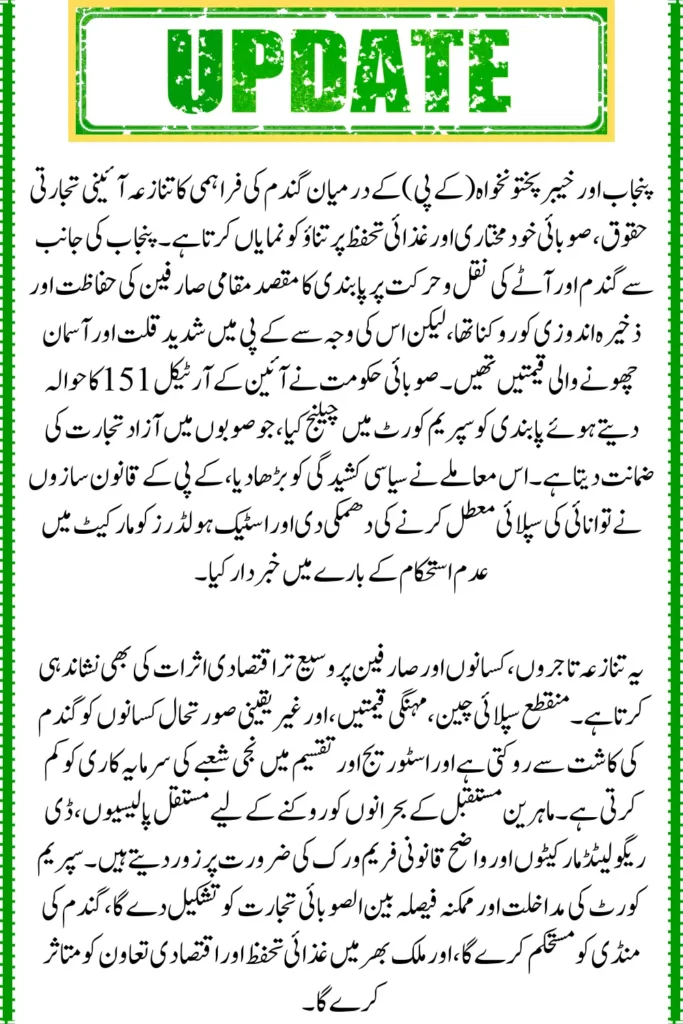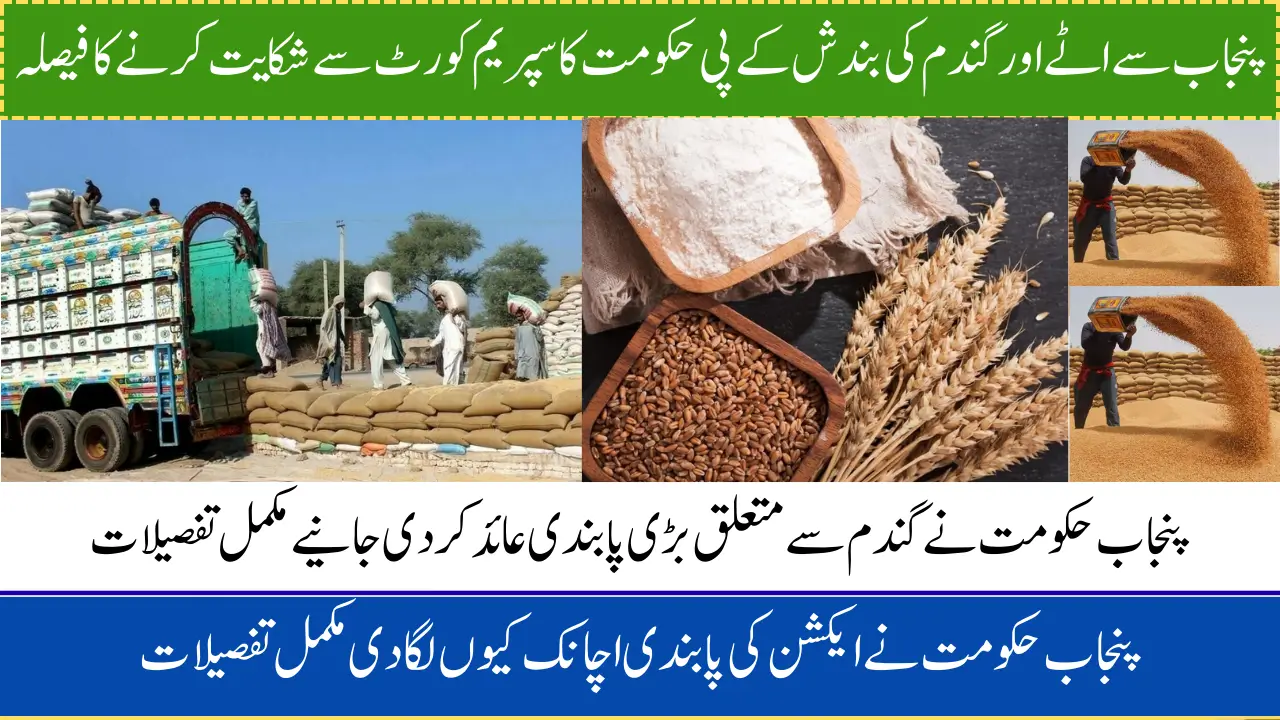Overview of the Wheat Import Ban Dispute
Wheat Import Ban Dispute. The KP government has challenged Punjab’s ban on supplying wheat and flour, claiming it violates Article 151 of the Constitution. KP relies on Punjab for 83% of its wheat needs, and the ban has caused a sharp rise in flour prices, reaching Rs2,800 for a 20-kg bag. Lawmakers and officials argue that Punjab’s checkpoints and restrictions disrupt the free movement of goods, creating shortages and inflation in KP. The provincial government has decided to take the matter to the Supreme Court to restore wheat supply and stabilize the market.

Punjab defends its move as necessary to control hoarding and ensure local food security. However, experts and millers say the ban is counterproductive, creating artificial shortages and discouraging private investment. Farmers may also reduce wheat production if prices remain unstable. The issue has sparked political tensions, with KP lawmakers threatening to suspend energy supplies to Punjab if the ban continues. Analysts warn that consistent policies and deregulated markets are essential to prevent future crises and protect both consumers and producers.
You Can Also Read: CM Punjab Free 3 Marla Plot Scheme 2025, Eligibility, Registration and Complete Allotment Guide
Background: KP Government’s Decision to Ban Wheat Imports
The Khyber Pakhtunkhwa (KP) government decided to challenge Punjab’s ban on wheat and flour supply after prices surged and shortages hit the province. KP depends on Punjab for 83% of its wheat, making the ban a major disruption to food security. Officials argue the move violates Article 151 of the Constitution, which guarantees free trade between provinces. KP has approached the Supreme Court to restore supply and stabilize prices. Key points include:
- Flour prices in KP rose up to Rs2,800 for a 20-kg bag due to Punjab’s restrictions.
- Punjab set up checkpoints to prevent wheat movement, citing hoarding concerns.
- KP lawmakers warn of potential suspension of electricity and gas supplies to Punjab if the ban continues.
- Experts say the ban discourages farmers and private investment in wheat production.
- Consistent policies and deregulated markets are essential to prevent future shortages.
KP’s move aims to restore wheat supply and protect consumers from soaring prices.
You Can Also Read: Sahiwal Electric Bus Check Routes, Stops, and Fare Details Explained
Reasons Behind the Ban: Economic and Political Factors
Punjab’s ban on wheat and flour supply to other provinces is driven by both economic and political factors. The government claims the restrictions are necessary to secure the local food supply and prevent hoarding. Critics argue the ban is politically motivated and disrupts free trade, causing shortages and soaring prices in provinces like KP. Key reasons include:
- Food Security: Punjab aims to stabilize the local wheat supply and protect consumers.
- Hoarding Prevention: Checkpoints were set up to stop illegal stockpiling and smuggling.
- Economic Control: Controlling wheat movement keeps local prices stable but raises costs elsewhere.
- Political Leverage: Restricting supply puts pressure on dependent provinces like KP and Sindh.
- Market Regulation Conflicts: The ban contradicts deregulation policies and discourages private investment in wheat storage and distribution.
Punjab’s wheat ban combines economic protection with political strategy, impacting prices and trade across provinces.
You Can Also Read: Pakistan Faces Sharp Fuel Price Surge, Petrol Costs Soar Again
Punjab Supreme Court’s Intervention: What Happened?
The Punjab Supreme Court intervened in the wheat supply dispute after KP challenged Punjab’s ban on interprovincial wheat and flour movement. The court reviewed claims from both sides regarding constitutional rights, food security, and market regulation. Key points include:
- Petitions Filed: KP approached the Supreme Court, citing Article 151, which guarantees free trade across provinces.
- Punjab’s Defense: Officials argued the ban protects local consumers and prevents hoarding.
- Court Review: The Supreme Court examined whether the restrictions violated constitutional trade rights.
- Market Impact: The delay in court decisions contributed to rising flour prices in KP and other provinces.
- Political Tension: The case intensified disputes between provincial governments over resource control and trade rights.
The Supreme Court’s review seeks to balance constitutional rights, food security, and fair trade between provinces.
You Can Also Read: Pakistan Faces Sharp Fuel Price Surge, Petrol Costs Soar Again
Legal Implications of the Court’s Decision
The Supreme Court’s decision on the wheat supply dispute carries significant legal implications for interprovincial trade and constitutional rights in Pakistan. The ruling could set a precedent on how provinces manage essential commodities while respecting Article 151, which guarantees free trade between provinces. Key points include:
- Constitutional Authority: Reinforces the legal framework for unrestricted interprovincial trade.
- Provincial Autonomy vs. National Unity: Balances a province’s right to secure local food with the federal principle of free commerce.
- Market Regulation: Clarifies the legality of administrative restrictions on commodity movement.
- Legal Precedent: Guides future disputes over resource allocation and provincial bans.
- Investor Confidence: A stable legal framework encourages private sector investment in wheat production and storage.
The court’s decision will shape constitutional trade rights and the regulation of essential commodities across provinces.
You Can Also Read: FBR’s Last-Minute Income Tax Return Changes, What Every Taxpayer Critical Details
Impact on Traders, Farmers, and Consumers
Punjab’s wheat supply ban has had a wide-ranging impact on traders, farmers, and consumers across Pakistan. Traders face logistical challenges and rising costs, farmers risk lower production incentives, and consumers struggle with soaring flour prices. Key points include:
- Traders: Checkpoints and restrictions disrupt supply chains and create market uncertainty.
- Farmers: Reduced wheat demand and price instability may discourage planting in the next season.
- Consumers: Flour prices in KP and other provinces have surged up to 68%, hitting low-income families hardest.
- Market Investment: Administrative restrictions reduce private sector confidence in wheat storage and trade.
- Economic Ripple Effect: The ban contributes to inflation and nationwide food insecurity.
The ban strains markets, discourages farmers, and increases costs for consumers, worsening the nationwide wheat crisis.
You Can Also Read: FBR’s Last-Minute Income Tax Return Changes, What Every Taxpayer Critical Details
Reactions from Political Parties and Stakeholders
Punjab’s wheat supply ban sparked strong reactions from political parties, provincial lawmakers, and industry stakeholders. KP lawmakers condemned the restrictions as unconstitutional, while flour millers and economists warned about market instability and rising prices. Key points include:
- KP Lawmakers: Called the ban a violation of Article 151 and threatened to suspend energy supplies to Punjab if it continued.
- Flour Millers Associations: Argued that the ban disrupts deregulated markets and discourages private investment.
- Economists Warned tthat he restrictions create artificial shortages and increase inflation.
- Federal Government Pressure: Other provinces urged intervention to restore free movement of wheat.
- Public Response: Rising flour prices have caused public unrest and criticism of Punjab’s policy.
The ban drew widespread political and industry criticism, highlighting tensions over constitutional rights and market stability.
You Can Also Read: Dubai Visa Ban 2026, Affected Countries, Implications, And Travel Advice
Possible Outcomes and Future Developments
The wheat supply dispute between Punjab and KP could lead to several economic and political outcomes, affecting trade, markets, and interprovincial relations. The situation remains uncertain as the Supreme Court and federal government consider interventions. Key points include:
- Supreme Court Ruling: Could enforce free trade across provinces or allow limited provincial restrictions.
- Market Stabilization: Restoring wheat movement may lower flour prices and ease shortages.
- Political Tensions: Provinces may negotiate or escalate disputes over resource control and constitutional rights.
- Farmer Incentives: Clear policies may encourage wheat planting and private sector investment in storage.
- Future Regulations: The ruling may set a legal precedent for managing essential commodities during shortages.
The dispute’s resolution will shape trade policies, market stability, and interprovincial relations in Pakistan.
You Can Also Read: Dubai Visa Ban 2026, Affected Countries, Implications, And Travel Advice
Conclusion: Key Takeaways from the Dispute
The wheat supply dispute between Punjab and KP highlights the delicate balance between provincial autonomy and constitutional trade rights. Punjab’s ban on interprovincial wheat movement aimed to protect local food security and prevent hoarding, but it caused severe shortages and soaring flour prices in KP and other provinces. The issue drew strong political reactions, with KP lawmakers threatening energy supply suspensions and industry stakeholders warning about market instability. The Supreme Court’s intervention plays a key role in clarifying the legal limits of provincial control over essential commodities.
The dispute also underscores the economic impact on traders, farmers, and consumers. Disrupted supply chains and price hikes have discouraged farmers from planting wheat and reduced private sector investment in storage and trade. Experts emphasize that consistent policies, deregulated markets, and a clear legal framework are essential to prevent future crises. Resolving this conflict will not only stabilize the wheat market but also strengthen interprovincial cooperation and protect consumers nationwide.
You Can Also Read: Punjab CM Initiates Major Development Works in South Punjab
FAQs
Why did the KP government challenge Punjab’s ban on wheat and flour supply?
KP challenged the ban because it depends on Punjab for 83% of its wheat. The restriction caused shortages and sharply increased flour prices, violating Article 151 of the Constitution, which guarantees free trade between provinces.
What reasons did Punjab give for restricting wheat movement?
Punjab claimed the restrictions were necessary to ensure local food security, prevent hoarding, and stop smuggling. Officials argued the measures protect consumers and stabilize local prices.
How did the ban affect traders, farmers, and consumers?
Traders faced disrupted supply chains and higher costs. Farmers were discouraged from planting wheat due to price instability, and consumers suffered from steep flour price increases, particularly in KP.
What role did the Supreme Court play in the dispute?
The Supreme Court reviewed petitions from KP challenging the ban. It assessed whether Punjab’s restrictions violated constitutional rights and considered the impact on interprovincial trade and food security.
What are the potential outcomes of the dispute?
The court ruling could restore free trade, stabilize flour prices, and set legal precedents for provincial authority over essential commodities. It may also encourage consistent policies, protect farmers, and boost private sector investment in wheat production and storage.
You Can Also Read: Punjab CM Initiates Major Development Works in South Punjab









